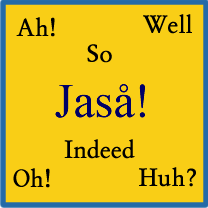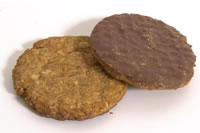
Here’s a recording in a mystery language.
Can you identify the language, and do you know where it’s spoken?

Here’s a recording in a mystery language.
Can you identify the language, and do you know where it’s spoken?
In the Duolingo Danish lessons I’ve been doing recently a number of words have popped with which are not really translated. One I noticed today is æbleskiver [ɛːbləˌsɡiːwɐ], which is simply translated as appleskives. That doesn’t really help as I don’t know what appleskives are.
Here’s an example sentence: Koen spiser mandens æbleskiver mens han kigger væk (The cow eats the man’s appleskives while he looks away).
From the context I guessed appleskives are something you eat and involve apples – æble = apple, but what?
The bab.la dictionary translates æbleskive as ‘pancake puff’, which doesn’t really help either.
According to Wikipedia, æbleskiver are ‘Pancake Puffs’ that are:
“spherical in shape. The name literally means apple slices in Danish, although apples are not usually an ingredient in present-day versions. Somewhat similar in texture to European pancakes crossed with a popover or Yorkshire pudding, æbleskiver are solid like a pancake but light and fluffy like a popover.”
Apparently they are traditionally eaten at Christmas, and are often served with gløgg (mulled wine). They are also served at children’s birthday parties.
This is more helpful, but what is a popover?
A popover is “a light, hollow roll made from an egg batter similar to that of Yorkshire pudding, typically baked in muffin tins or dedicated popover pans, which have straight-walled sides rather than angled.” [source].
So now we know.
Next time I go to Denmark, I will look out for æbleskiver, and try some. They sound quite tasty. I’ll have to make sure that no cows take them while I’m not looking though.

An interesting Swedish word I learned recently is jaså [ˈjasɔ]. It is described by Wiktionary as an ‘expression of mild surprise’, and can be translated as ‘indeed, so, well then, oh, well, ah, huh’. So it’s quite a useful little word.
Here are some examples of how it’s used (from bab.la):
Equivalents in Danish appear to be åh, nå, nåh and tja.
What equivalent words are there in other languages?

Here’s a recording in a mystery language.
Can you identify the language, and do you know where it’s spoken?
Last week I learnt that a butterfly in Cornish is a tykki Duw [tɪkˑi’dyˑʊ / tɪkˑi’diˑʊ], or literally “God’s pretty thing”. A moth is a tykki Duw nos or “God’s pretty thing of the night”).
The word tykki comes from teg (pretty, attractive), and Duw comes from the Proto-Celtic *dēwos (god), from the Proto-Indo-European *deywós (god), from *dyew- (sky, heaven).
Names for butterflies are interesting in other languages as well:
What about in other languages?
Sources: Gerlyver Kernewek, Wiktionary, Geiriadur Prifysgol Cymru, Geiriadur yr Academi, Am Faclair Beag On-line Manx Dictionary, Dictionnaire Favereau, bab.la
As you may or may not be aware, I have another blog called Multilingual Musings, which was where I practised using languages I’m learning, and posted interesting words that come up in the French conversation group I go to.
Recently I transfered all the content from there to this blog, and renamed that blog Celtiadur. I am now building an etymological dictionary of Celtic languages there.
It will contain information about the six modern Celtic languages: Irish, Scottish Gaelic, Manx, Welsh, Cornish and Breton, as well as their historical versions and ancestors.
The name Celtiadur is one I coined which combines the word celt and the Welsh suffix -adur, which appears in such words as geiriadur (dictionary), dyddiadur (diary), gwyddoniadur (encyclopedia) and ieithiadur (grammar, dictionary, vocabulary). It is also used in Breton.
There isn’t much there yet, but I will be transferring all the words in my Celtic Cognates section, and adding many more.

Here’s a recording in a mystery language.
Can you identify the language, and do you know where it’s spoken?

I learned today that there are several words for leave in Danish, so I thought I’d investigate.
Forlade means to leave, abandon, depart, forsake, quit, desert or vacate. For example: Elvis har forladt bygningen (Elvis has left the building).
Afrejse means to leave, depart or departure. For example, Jeg afrejse i morgen (I’m leaving tomorrow). Is this different from forlade?
Efterlade means to leave or leave behind, for example: Vi forlod Elvis i bygningen (We left Elvis in the building).
Overlade means to leave or entrust. For example: Overlad sangen til Elvis (Leave the singing to Elvis).
Løslade means to release, let, free, leave, allow. For example, Løslad Elvis nu! (Release Elvis now!).
Lade on its own means to let, allow, reload; or shed, shack or barn.
Do other languages have different words for different kinds of leaving?
The photo is one I took in Berlin Hauptbahnhof. You can see a larger verison on Flickr.

Here’s a recording in a mystery language.
Can you identify the language, and do you know where it’s spoken?

Do you hobnob? Have you ever hobnobbed? Would you hobnob?
To hobnob means “to spend time being friendly with someone who is important or famous”, according to the Cambridge Dictionary.
According to Meriam-Webster, to hobnob means “to drink sociably” (archaic), or “to associate familiarly”.
The words hob and nob first appeared together in print Shakespeare’s Twelfth Night and meant “hit or miss”, and probably come from habnab (in one way or another). The phrase “to drink hobnob” (to drink alternately to each other) became popular, and as drinking was a shared activity, hobnob came to refer to a friendly social interaction.
Wikitionary defines to verb to hobnob as follows:
The noun hobnob is defined as:
Apparently it comes from hob and nob, a toasting phrase possibly meaning “give and take”, from dialectal hab nab (“to have or have not”, in the sense of an invitation to have a drink), from Old English habban (to have, possess).
Hobbnobby hobnobbers hobnob snobs nibbling hobnobs. Say that quickly a few times. It might be more difficult if you’ve just eaten a hobnob (a kind of biscuit, pictured above) and are suffering from hobnob gob.
This word came up at the French conversation group last night, and we discovered that the French equvialent is frayer avec qn or fréquenter qn.
For example “On n’a rien perdu, à part la possibilité de frayer avec un tas de snobs malheureux.” (We haven’t lost a thing except the chance to hobnob with a bunch of unhappy snobs.) [source].
Frayer means to open up, clear or spawn, and frayer avec means to associate/mix with [source]. It is used in such expressions as:
Are there words meaning similar things in other languages?